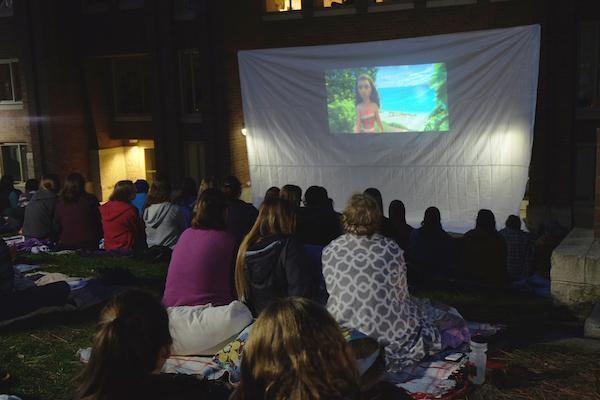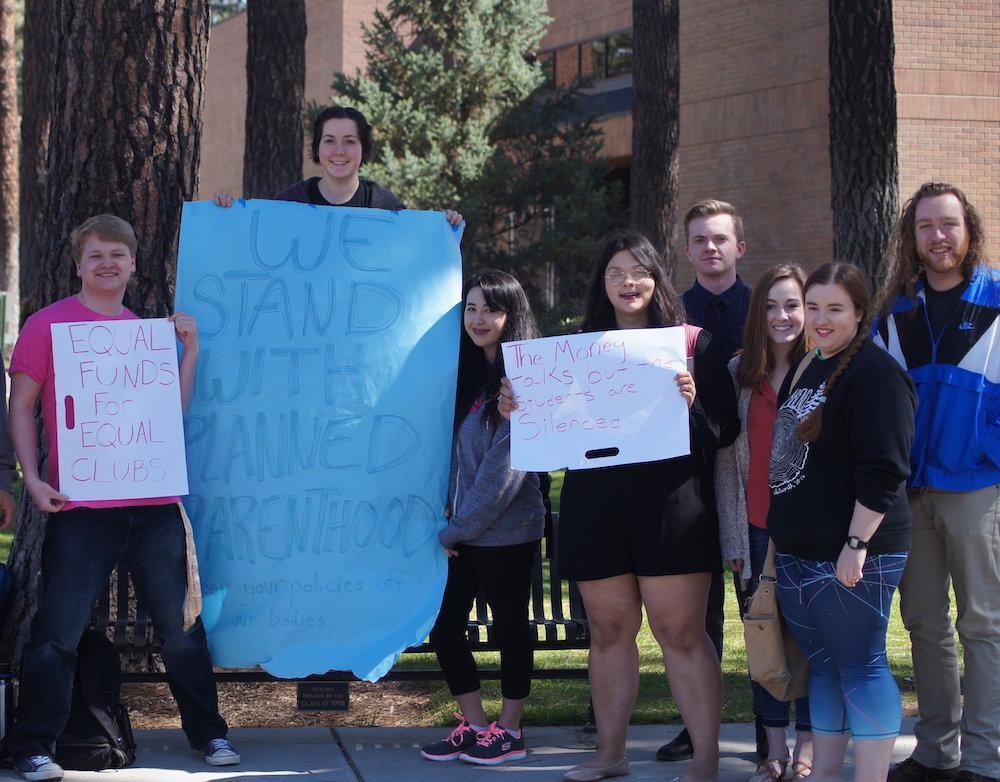Students and administration weigh in on whether smoking cigarettes and marijuana should be allowed on campus
by Hayley O’Brien|Arts & Culture Editor
The right to smoke tobacco on campus was hard-won for the students of the 1970s. However, this year administration will look into taking that right away.
Dean of Students Rhosetta Rhodes will explore the option to make Whitworth a tobacco-free campus, she said.
Last year, students suggested to Rhodes that Whitworth prohibit tobacco use on campus and Rhodes agreed to follow up on the idea.
“The harm and impact of tobacco is not congruent with our mind and heart education and educational goals,” Rhodes said.
The dispute over whether to allow tobacco use on campus was long and laborious for the Whitworth students of the 1970s.
Three students stood outside the cafeteria for a week asking students to sign a petition urging the school to allow cigarettes on campus, according to a spring 1970 edition of the Whitworthian.
Many of the 1970 editions of the Whitworthian were filled with students and administration writing letters to the editor about the tobacco policy.
“Let us get away from the petty issues of smoking, etc., grant them, give the students the rights which are already theirs. Do not be so big and grand about granting rights that already belong to us,” student Steve Kohler wrote in the March 31, 1970, edition.
To many students of the 1970s it was not a matter of wanting to smoke but the perceived judgment call by the administration on what constitutes a Christian.
“Is the Administration trying to play God or something? It seems that they are setting up the criteria for being a Christian—that is, if you smoke or drink you cannot be a Christian,” student Durand Splater wrote in the March 31, 1970 edition.
Splater was not the only student who wrote about the implications of smoking.
One person said “I am not supporting smoking or drinking, but object to the implication that Whitworth makes as a result of its policy: that one cannot be a Christian and smoke and/or drink at the same time,” according to an editorial on Jan. 30, 1970.
The policy for tobacco use changed in fall 1970, after many debates over where Whitworth should stand on the issue. However, perceived judgment of those using tobacco on campus persists.
Senior Kaitlin Jarrell said she stopped smoking on campus last year because “it wasn’t worth it to have all the dirty looks.”
For that reason and others, it is rare to see a student smoking tobacco on campus. However, soon it might not just be rare but a violation of the Big Three.
Non-smoking students have mixed feelings about whether or not smoking should be allowed on campus.
Some non-smoking students said that although they personally do not like smoking, cigarettes should be allowed on campus as long as those smoking stay in the designated smoking areas.
“I think individuals have the ability to make their own choices as long as it’s not harming other people,” junior Andrew Langbehn said.
“I agree with the outdoor policy,” senior Eric Zimmerman said.“I support people’s right to slowly kill themselves.”
Other students disagreed, saying smoking should be prohibited.
Cigarettes should not be smoked on campus “because the smell is atrocious,” junior Spencer Locati said.
Students expressed concerns about health risks involved with second-hand smoke.
“It’s a health hazard to those who don’t smoke as well as those who do,” sophomore Justin Livengood said. “Although smoking is an individual’s right, it’s something that affects the whole campus.”
“If I choose not to smoke I don’t want other students to do something that’s affecting me,” senior Celeste Campos said.
Tobacco, according to the National Institute on Drug Abuse’s website, contains the highly addictive drug nicotine as well as other chemicals such as carbon monoxide, tar, formaldehyde, cyanide and ammonia which are known to cause cancer.
Those chemicals can be inhaled by people close to someone smoking cigarettes even if they are not smoking themselves, according to the NIDA.
“I believe that the proven dangers and impact of tobacco are not conducive to our educational goals,” Rhodes said.
For that same reason as well as remaining in compliance with Federal law, marijuana is not allowed on campus despite its legalization in the state of Washington in 2014.
Whitworth’s current drug policy prohibits the use of “mood altering substances,” such as marijuana, without a prescription, according to the 2016-2017 student handbook.
Even with a prescription, there are severe limitations to the possibility of marijuana use by students.
Unless educational support services has concluded with the student and a physician that there is no reasonable alternative to using marijuana for medicinal purposes, medical marijuana will not be allowed, Rhodes said.
“Our go-to place is no marijuana use, period,” she said. “However, we will look at it on a case-by-case basis.”
The U.S. Food and Drug Administration does not recognize marijuana as medicine, according to the NIDA.
However, the NIDA does recognize the chemicals, cannabinoids, found in marijuana plants to be medicinal. There are currently “two FDA-approved medications that contain cannabinoid chemicals in pill form,” according to the website.
The science behind medicinal marijuana still needs research; however, scientific theories exist about why marijuana might prove medicinal.
“There are receptors on nerve cells in the brain to which this molecule can bind,” botanist Lee Anne Chaney said. “And that is probably the basis for medicinal and maybe recreational uses as well as maybe some of the side effects for that.”
No students have sought to use medical marijuana within the past two years, said Craig Chatriand, associate dean of community standards and compliance.
Unlike cigarettes, research into marijuana is limited because of the criminalization of the drug by the Federal Government.
“Because the chemicals when you smoke the marijuana material would be different (than nicotine), we don’t have good research about (the effects),” Chaney said. “We also do not have the years and years and years of people who’ve smoked six packs a day for their whole life in the equivalent in marijuana to use to see if you smoke for 60 years what do you get.”
The prohibition of marijuana on campus has not stopped students from using it.
“Last year six students were found responsible for using or having marijuana on campus,” said Tim Caldwell, director of residence life.
Some students who smoke marijuana said Whitworth policies toward marijuana should be different than tobacco policy.
“I think marijuana should be grouped with alcohol,” Jarrell said. “Cigarettes don’t prohibit your ability to make judgments.”
Other non-smoking students agreed, saying marijuana should not be used on campus.
Marijuana should not be allowed on campus because, “it’s against Federal law,” junior Shelby Beedle said.
Some students reasoned smoking marijuana should be treated the same as cigarettes.
“I think if you’re going to have one, you should allow all three [tobacco, marijuana and alcohol],” Zimmerman said.
Neither cigarettes nor marijuana should be allowed to be smoked on campus, Livengood said.
hobrien17@my.whitworth.edu












 Spokane?
Spokane?